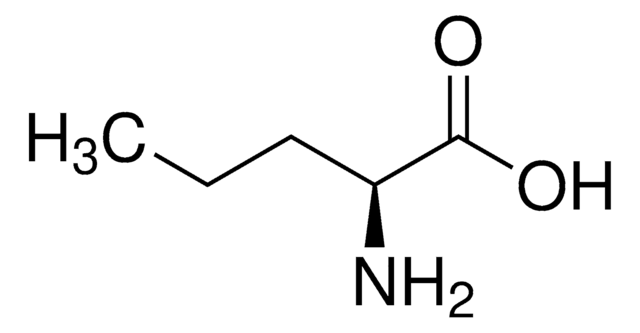8.07666
Sarcosine
for peptide synthesis
Sinónimos:
Sarcosine, Methylaminoacetic acid, N-Methylglycine
About This Item
Productos recomendados
Nombre del producto
Sarcosine, for synthesis
Quality Level
form
powder
pH
6.1 (20 °C, 100 g/L in H2O)
solubility
1481 g/L
bulk density
600 kg/m3
storage temp.
2-30°C
InChI
1S/C3H7NO2/c1-4-2-3(5)6/h4H,2H2,1H3,(H,5,6)
InChI key
FSYKKLYZXJSNPZ-UHFFFAOYSA-N
Categorías relacionadas
Application
- Enhancement of biogenic non-extractable residue formation: Sarcosine′s role is examined in the context of nitrogen-fertilizer addition to soil, where it enhances the formation of biogenic non-extractable residues from glyphosate, with implications for agricultural chemical management (Aslam and Nowak, 2024).
- PolySarcosine as an alternative to PEGylation: Recent advancements highlight polySarcosine as a promising alternative to PEGylation for biomedical applications, underscoring its synthesis and utility in enhancing drug delivery systems (Kabil et al., 2024).
- Sensitive sarcosine detection: A novel ratiometric fluorescent assay employs MOF nanozyme-mediated tandem catalysis guided by a logic circuit for highly sensitive detection of sarcosine, enabling smartphone-based portable sensing applications (Hou et al., 2024).
- Photothermal biosensing for sarcosine quantification: A microfluidic paper-based analytical device integrated with photothermal biosensing offers a new method for the sensitive quantification of sarcosine, facilitating rapid and efficient detection (Khachornsakkul and Leelasattarathkul, 2024).
Storage Class
11 - Combustible Solids
wgk_germany
WGK 1
flash_point_f
Not applicable
flash_point_c
Not applicable
Certificados de análisis (COA)
Busque Certificados de análisis (COA) introduciendo el número de lote del producto. Los números de lote se encuentran en la etiqueta del producto después de las palabras «Lot» o «Batch»
¿Ya tiene este producto?
Encuentre la documentación para los productos que ha comprado recientemente en la Biblioteca de documentos.
Nuestro equipo de científicos tiene experiencia en todas las áreas de investigación: Ciencias de la vida, Ciencia de los materiales, Síntesis química, Cromatografía, Analítica y muchas otras.
Póngase en contacto con el Servicio técnico






